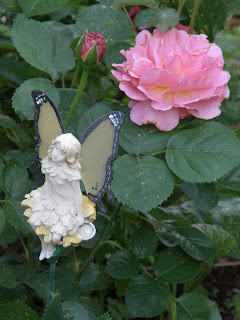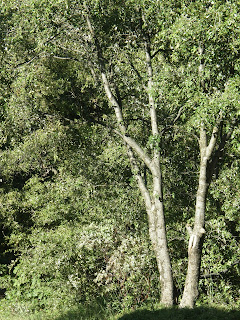Twice, now, I’ve encountered Sierra Mountain Kingsnakes on my
evening walk. These gorgeous, white-, black- and red-banded reptiles (Lampropeltis
zonata multicincta) are usually
nocturnal, so it’s quite a treat to see one during the day or evening hours.
Kingsnakes eat lizards, small mammals, nestling birds, bird eggs, amphibians,
and occasionally snakes, including its own species, so they are formidable hunters.
They are usually quite
secretive, as well, and the one I saw yesterday evening was no exception. I
encountered it climbing a sheer red clay road bank about 12 feet high. This
bank is always a source on interest to me, as it is studded with holes of all
sizes, like a critter apartment house. Apparently, that is what drew the
snake’s interest, too. It slithered up the bank in graceful S-curves, defying
gravity and stopping to thrust its head into any hole large enough to
accommodate it, hunting for who knows whom.
When it came to the top of
the bank, it stopped and waited. I had the feeling it was waiting for me to go
away, so that it could hide itself. I turned away and took a few steps up the
slope, then turned just in time to see it secret itself under an exposed root,
where it was completely invisible. Actors and comedians know that timing is
everything, and the same is true in sightings of wild things. They are all out
there, doing the things that wild things do, but our perceptions of them are
fleeting. They are expert at concealing themselves from our probing eyes and
intellects and hurtful hands.
These two sightings, plus
finding a baby rattlesnake dead on the road, remind me to be extra vigilant,
now that the weather is warmer. The very first lesson I can remember my parents
instilling, long before manners or chores, was always to look several steps
ahead of me when I walked. This habit has saved me a number of times. You
should see me levitate, when my foot is poised to fall on a coiled rattler!
That one small act is a study in relativity!
Anyway, seeing these beautiful
snakes brought to mind D. H. Lawrence’s poem, “Snake,” which I offer to you
this morning as a meditation on the honoring of things that may seem, on the
surface, less than desirable. Lest we, too, have a pettiness to expiate.
Snake
A snake came to my
water-trough
On a hot, hot day, and I in
pyjamas for the heat,
To drink there.
In the deep, strange-scented
shade of the great dark carob-tree
I came down the steps with my
pitcher
And must wait, must stand and
wait, for there he was at the trough before
me.
He reached down from a
fissure in the earth-wall in the gloom
And trailed his yellow-brown
slackness soft-bellied down, over the edge of
the stone trough
And rested his throat upon
the stone bottom,
And where the water had
dripped from the tap, in a small clearness,
He sipped with his straight
mouth,
Softly drank through his
straight gums, into his slack long body,
Silently.
Someone was before me at my
water-trough,
And I, like a second comer,
waiting.
He lifted his head from his
drinking, as cattle do,
And looked at me vaguely, as
drinking cattle do,
And flickered his two-forked
tongue from his lips, and mused a moment,
And stooped and drank a
little more,
Being earth-brown,
earth-golden from the burning bowels of the earth
On the day of Sicilian July,
with Etna smoking.
The voice of my education
said to me
He must be killed,
For in Sicily the black,
black snakes are innocent, the gold are venomous.
And voices in me said, If you
were a man
You would take a stick and
break him now, and finish him off.
But must I confess how I
liked him,
How glad I was he had come
like a guest in quiet, to drink at my water-trough
And depart peaceful,
pacified, and thankless,
Into the burning bowels of
this earth?
Was it cowardice, that I
dared not kill him? Was it perversity, that I longed to talk to him? Was it
humility, to feel so honoured?
I felt so honoured.
And yet those voices:
If you were not afraid, you
would kill him!
And truly I was afraid, I was
most afraid, But even so, honoured still more
That he should seek my
hospitality
From out the dark door of the
secret earth.
He drank enough
And lifted his head,
dreamily, as one who has drunken,
And flickered his tongue like
a forked night on the air, so black,
Seeming to lick his lips,
And looked around like a god,
unseeing, into the air,
And slowly turned his head,
And slowly, very slowly, as
if thrice adream,
Proceeded to draw his slow
length curving round
And climb again the broken
bank of my wall-face.
And as he put his head into
that dreadful hole,
And as he slowly drew up,
snake-easing his shoulders, and entered farther,
A sort of horror, a sort of
protest against his withdrawing into that horrid black hole,
Deliberately going into the
blackness, and slowly drawing himself after,
Overcame me now his back was
turned.
I looked round, I put down my
pitcher,
I picked up a clumsy log
And threw it at the
water-trough with a clatter.
I think it did not hit him,
But suddenly that part of him
that was left behind convulsed in undignified haste.
Writhed like lightning, and
was gone
Into the black hole, the
earth-lipped fissure in the wall-front,
At which, in the intense
still noon, I stared with fascination.
And immediately I regretted
it.
I thought how paltry, how
vulgar, what a mean act!
I despised myself and the
voices of my accursed human education.
And I thought of the
albatross
And I wished he would come
back, my snake.
For he seemed to me again
like a king,
Like a king in exile,
uncrowned in the underworld,
Now due to be crowned again.
And so, I missed my chance
with one of the lords
Of life.
And I have something to
expiate:
A pettiness.
Taormina, 1923






































